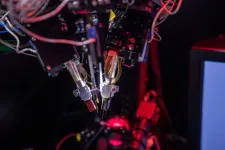(Press-News.org) If a man and a woman each suffer a heart attack, you may assume the symptoms and diagnoses should be the same.
That’s not always the case. While men are more likely to show the more “typical” signs of a heart attack — chest pains, shortness of breath — women are more likely to experience pain in their necks or symptoms that feel like heartburn or nausea. An angiogram that shows a blockage in male blood vessels may not show occlusion in a woman’s smaller vessels, and these differences can lead to misdiagnoses or lack of treatment.
Tulane University has received a 5-year, $11.2 million grant from the National Institutes of Health to establish a Center of Biological Research Excellence (COBRE) in Sex-Based Precision Medicine. The center will explore the differences between biological sexes and genders, investigate how those differences can impact medical outcomes, and potentially help shape specialized treatments.
Principal investigators Dr. Franck Mauvais-Jarvis, professor of medicine and director of the Center of Excellence in Sex-Based Biology & Medicine at Tulane University, and Dr. M.A. "Tonette" Krousel-Wood, the Jack Aron Chair in Primary Care Medicine and the director of the Center for Health Outcomes, Implementation and Community Engaged Sciences (CHOICES) at Tulane University, will lead the center’s efforts to examine the biological sex and gender differences in pursuit of more equitable medical treatments.
“Adult males and females are different patient populations; you cannot pool them together,” Mauvais-Jarvis said. “They don’t have the same heart attacks. Females are more likely to get autoimmune diseases like rheumatoid arthritis or lupus. The differences are not just due to testosterone and estrogen. There’s something else.”
The COBRE will fund a wide spectrum of innovative research involving investigators from across the university. This includes a first-of-its-kind investigation of how biological sex and estrogen impact pneumonia infections — and why women are more susceptible. Researchers will also work to engineer sex-specific, miniaturized models of human tissues and organs to study sex differences in diseases without the need for animal models.
“If you find a disease that is less common in females than males or vice versa, it means that one sex is protected, right? So if you can harness the biological forces that protect one sex compared to the other, well, then you have a therapeutic avenue for both sexes,” Mauvais-Jarvis said.
The grant will also allow the center to train a new generation of researchers and medical students in the concepts of sex-based precision medicine and how gender, which is a social construct, affects health and healthcare.
“This COBRE provides an excellent opportunity to build our capacity in Louisiana and beyond to advance the science of sex-based precision medicine, enabling the delivery of timely evidence-based treatment across sex and gender,” said Krousel-Wood, who is also a professor of medicine and epidemiology. “We will accomplish this by building a cadre of outstanding investigators as well as robust resources to support novel research that will translate into initiatives and treatments to improve human health across sex and gender.”
Historically, medical research studies were conducted primarily on males, resulting in clinical diagnoses that predominantly favor symptoms shown by men. While some medical guidelines have been updated in recent years to include symptoms shown in women, Mauvais-Jarvis said there is more work to do to understand just how different male and female bodies are. Importantly, the center will provide a platform for training and supporting research to identify underlying mechanisms for health disparities and providing critical insights from basic to population health research to optimize health equity across sex and gender, Krousel-Wood said.
“For the past century, the 170-pound man has been the representative of the human species, but if you treat all women according to a man’s biology, you will hurt them,” Mauvais-Jarvis said. “Our goal is to identify and harness these different biological forces to help us treat them equally.”
END
Tulane awarded $11.2 million NIH grant to pioneer sex-based precision medicine
2024-07-16
ELSE PRESS RELEASES FROM THIS DATE:
Study reveals dual role of protein in cancer treatment
2024-07-16
Investigators at the UCLA Health Jonsson Comprehensive Cancer Center have uncovered new details about the role of a protein called interferon regulatory factor (IRF1) in cancer progression and treatment response, offering new insight that can potentially help improve the effectiveness of cancer immunotherapy.
The study, published in Cell Reports, reveals how IRF1 can both hinder and help the body's immune response to tumors, depending upon which cells the protein is found in.
“We know IRF1 plays ...
Friends and at-risk youth may need extra support for their mental well-being
2024-07-16
Friends of young people who self-harm or have suicidal thoughts may need additional support to prevent negative outcomes on their own mental wellbeing, in addition to the support needed by young people who self-harm.
While much research rightly focuses on young people at risk and their families, friendships are rarely considered in research into self-harm, according to a new study from experts at the University of Birmingham.
In an extensive literature review, the team set out to draw together all the research in this area to reach a better understanding of common themes around friendship and self-harm ...
Children living in deprived areas are three times more likely to need dental extractions in hospital
2024-07-16
Researchers at Queen Mary University of London have found that children living in areas with high levels of deprivation are three times more likely to have severe tooth decay that requires a dental extraction in hospital, compared with children living in more affluent areas. The findings highlight an urgent need for equitable access to preventive dentistry.
In the study, published today (16 July 2024) in BMJ Public Health, researchers analysed de-identified GP and hospital records for 600,000 children ...
Lowering systolic blood pressure below 120 mmHg may reduce dementia risk among Black, Latino populations
2024-07-16
FOR IMMEDIATE RELEASE
Monday, July 15, 2024
Contact:
Jillian McKoy, jpmckoy@bu.edu
Michael Saunders, msaunder@bu.edu
##
Lowering Systolic Blood Pressure below 120 mmHg May Reduce Dementia Risk Among Black, Latino Populations
A new study suggests that reducing systolic blood pressure below the clinically safe threshold of 120 mmHg over time may produce slight health-protective benefits against late-life dementia and help reduce racial and ethnic disparities in both hypertension and hypertension control.
Hypertension is one of the most modifiable risk factors for dementia, but most research on dementia risk reduction through blood ...
When to let Amazon sell for you
2024-07-16
AUSTIN, Texas — On Prime Day, Amazon shoppers will be able to browse over 600 million products. They may not be aware that most of those listings are from non-Amazon sellers, who account for 60% of sales on the platform. Most are small- and medium-sized businesses: bookstores selling used hardbacks, toymakers selling original goods, and distributors unloading clothes.
What shoppers also don’t see is the choice that the platform and the seller make about how to interact. Is it better ...
New OpenScope projects aim to pioneer the future of neuroscience
2024-07-16
By Jake Siegel
SEATTLE, WASH.—July 15, 2024—How do neurons react to magic mushrooms? What happens in the brain when we see motion, or when we recognize grain patterns in a piece of wood? How do our brains track the subtle changes in our friends’ appearances over time?
The Allen Institute has launched four projects to investigate these questions through OpenScope, a shared neuroscience observatory. Just as astronomers use a few well-equipped observatories to study the universe, the OpenScope program lets neuroscientists worldwide propose and direct experiments on the Allen Brain Observatory pipeline. ...
Silicon photonics light the way toward large-scale applications in quantum information
2024-07-15
In a significant leap forward for quantum technology, researchers have achieved a milestone in harnessing the frequency dimension within integrated photonics. This breakthrough not only promises advancements in quantum computing but also lays the groundwork for ultra-secure communications networks.
Integrated photonics, the manipulation of light within tiny circuits on silicon chips, has long held promise for quantum applications due to its scalability and compatibility with existing telecommunications infrastructure.
In a study published in Advanced Photonics, researchers from the Centre for Nanosciences and Nanotechnology (C2N), Télécom Paris, ...
Better together: spatial arrangement of three immune cells is key to attacking tumors
2024-07-15
There’s a frustrating fact about today’s immunotherapies for cancer. While sometimes they work beautifully — completely eliminating or greatly reducing cancer in particular patients — other times they don’t work at all. It’s a mystery.
Scientists have posed several hypotheses to explain the disparity. Perhaps it’s the number of mutations present in a tumor, with more mutations leading to better responses. Or maybe it’s the tissue environment surrounding the tumor, with some environments supporting and others suppressing effective immune responses. But so far, none of these ...
How a ‘social good’ firm is defined can impact its value creation and value capital
2024-07-15
Ventures that pursue both commercial and social value creation have grown in popularity in recent years, but a new study published in the Strategic Entrepreneurship Journal better defines four distinct types of social ventures. By training a business model lens on these social good ventures, the study offers insight on how the model choices impact a firm's value creation and value capture potential.
“Despite the popularity of the term ‘social entrepreneurship,’ not much was known about the business model of such companies yet,” says study co-author Lien De Cuyper of ...
American diets got briefly healthier, more diverse during COVID-19 pandemic
2024-07-15
UNIVERSITY PARK, Pa. — American diets may have gotten healthier and more diverse in the months following the start of the COVID-19 pandemic, according to a new study led by Penn State researchers.
The study — published in PLOS ONE — found that as states responded to the pandemic with school closures and other lockdown measures, citizens’ diet quality improved by up to 8.5% and food diversity improved by up to 2.6%.
Co-author Edward Jaenicke, professor of agricultural economics in the College ...

